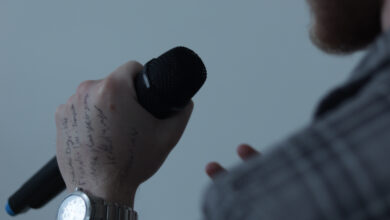
Echoes of Empires, The Courtyard Theatre
For Camden Fringe 2025 we are attempting to reach 100 interviews to highlight as many of the shows performing as we possibly can. Every day we will publish new interviews, so do keep coming back to see how close to our target we can get. You can find all our Camden Fringe interviews here.
Borders can shift. Power can fall. But the empire always lingers – in accents, in bedrooms, in the silence between lovers.
Acclaimed theatre artist Vkinn Vats presents a powerful new play Echoes of Empires, a visceral and intimate drama that unearths the legacies of colonialism, class, love, loyalty, identity and cultural displacement in a modern world.
The play asks: What do we owe to history? And how do we reconcile the burdens of it with our own desires and choices now? Luckily, we had the opportunity to interview Vkinn to dig deeper into the origins of the work.
Echoes of Empires will play at The Courtyard Theatre from Sunday 3 to Wednesday 6 August (tickets here).
What can audiences expect from the show?
Echoes of Empires is an intimate, raw, and politically charged brand new play. Audiences can expect a collision of love and history — where personal relationships become battlegrounds for colonial memory, identity, and power. It’s a house party that unravels. Four people. One night. Lots of wine, questions, and emotional truths. The show moves between humour and heartbreak, tenderness and tension. It’s about who gets to belong, who gets to love freely, and what we carry — across generations, across cultures, and across beds.
Is Camden Fringe going to be the show’s first time on stage, or have you already performed elsewhere?
Yes, Echoes of Empires is having its world premiere at the Camden Fringe. I chose Camden Fringe because it champions bold, independent voices and gives emerging artists the space to take creative risks. This play is intimate, political, messy, and deeply personal—it felt right to debut it in a festival that celebrates boundary-pushing work in an unfiltered, immediate way. There’s something thrilling about sharing this story for the very first time with a Camden audience.
What was your inspiration behind the show?
Echoes of Empires was born from a desire to explore the intimate collisions between love, identity, and legacy – particularly in the context of post-colonial relationships. I wanted to write a piece that felt both personal and political. The play is set in a London flat, but the tensions inside that space ripple outward – through history, race, class, desire, and power.
As someone navigating diasporic experience myself, I’ve always been fascinated by how the past creeps into our most intimate moments – how colonial residue still lives in language, humour, sex, and silence. This play was my way of investigating those echoes: how love can be tender and brutal, how privilege can be invisible, and how even a house party can become a battlefield of identity. It’s a deeply human story—but it’s also a reckoning.
Is this version how you originally envisioned it or has it changed drastically since you first put pen to paper?
I’ve been working on the play for nine months now. It’s both deeply familiar and completely transformed. What began as a series of intimate dialogues evolved into something much more layered and theatrical. The characters grew sharper, bolder. The politics became more present—sometimes even uncomfortably so. Certain scenes that once felt central were cut; others that emerged unexpectedly became emotional anchors. So no—it’s not what I imagined. It’s better. It’s riskier. It breathes differently.
Are there any plans for what comes next after the show has finished its run – for you or the show?
Absolutely. Echoes of Empires has always felt bigger than a single run—it’s a story that speaks to many cities, many audiences. After the Camden Fringe premiere, we’re actively exploring options for a longer London run and possible touring opportunities—both nationally and internationally. The dream is to see it on big international stages across the world—where its themes of identity, race, intimacy, and post-colonial tension can spark rich dialogue across cultures.
Who would play you in the Hollywood adaptation of your future autobiography?
Ideally? A younger, moodier Dev Patel with a touch of Riz Ahmed’s poetic rebellion. But honestly, it would probably be an unknown actor from somewhere unexpected—raw, soulful, a little bit chaotic—just like the journey itself.
If you had to describe your show as a colour what would it be?
A deep, burnished gold. The kind that catches light differently depending on where you stand. It holds both warmth and weight—heritage, memory, desire, and rupture. It’s the colour of something ancient being reimagined, of something beautiful that’s also been bruised. Like colonial silk soaked in red wine. Or a love story lit by fire and shadows.
What’s the most valuable piece of advice you’ve received during your career, and how has it influenced your work on this show?
“Write from the wound, not the scar.” That stayed with me. It reminded me to create from the place that’s still tender—unresolved, uncomfortable, real. With Echoes of Empires, I stopped trying to sanitise the contradictions—between cultures, between people, between love and history. Instead, I let them live in the play. That vulnerability, I think, is what makes it truthful.
Thank you, Vkinn, for spending the time to so eloquently describe this play. We’re really curious to get to see it now. Echoes of Empires will play at The Courtyard Theatre from Sunday 3 to Wednesday 6 August.






